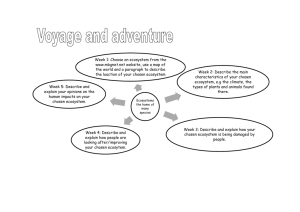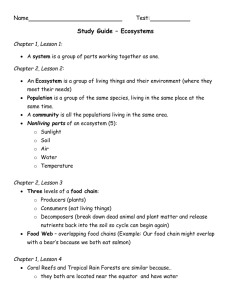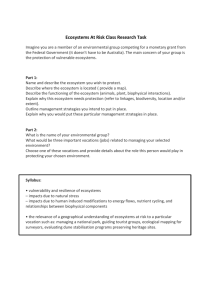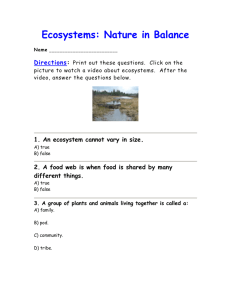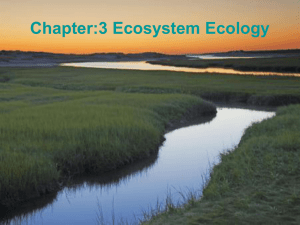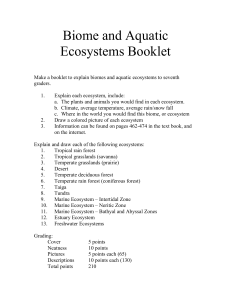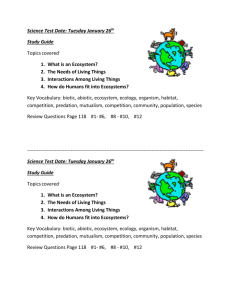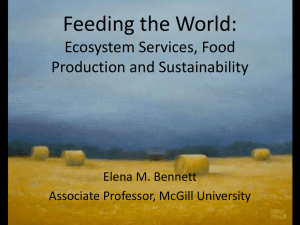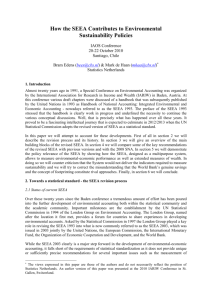GLOBAL INITIATIVE FOR ENVIRONMENTAL ACCOUNTING
advertisement
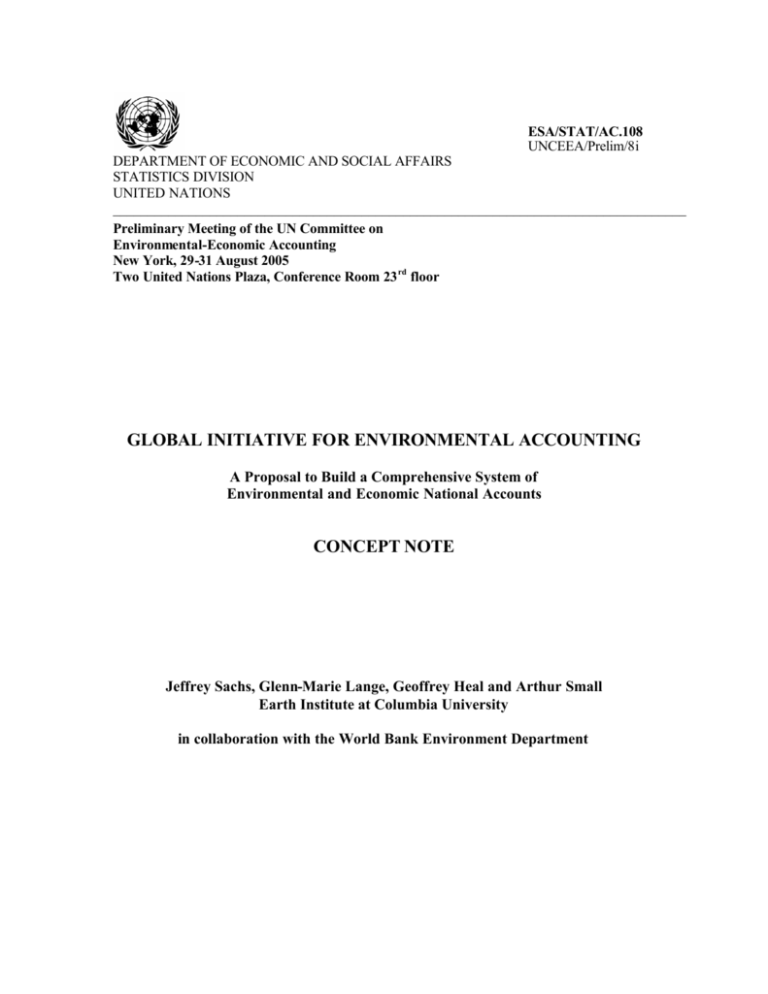
ESA/STAT/AC.108 UNCEEA/Prelim/8i DEPARTMENT OF ECONOMIC AND SOCIAL AFFAIRS STATISTICS DIVISION UNITED NATIONS ___________________________________________________________________________________ Preliminary Meeting of the UN Committee on Environmental-Economic Accounting New York, 29-31 August 2005 Two United Nations Plaza, Conference Room 23 rd floor GLOBAL INITIATIVE FOR ENVIRONMENTAL ACCOUNTING A Proposal to Build a Comprehensive System of Environmental and Economic National Accounts CONCEPT NOTE Jeffrey Sachs, Glenn-Marie Lange, Geoffrey Heal and Arthur Small Earth Institute at Columbia University in collaboration with the World Bank Environment Department Over the past decade most countries have embraced the notion of sustainable development, popularly expressed by the Brundtland Commission Report, Our Common Future, as ‘…development that meets the needs of the present without compromising the ability of future generations to meet their own needs. 1 Sustainable development serves as the stated objective of many development initiatives, most recently the Millennium Development Goals (MDG), but ecosystems are still deteriorating worldwide, and with them, the capacity to support human well-being. This problem is clearly stated in the recent summary of the report of the Millennium Ecosystem Assessment by its Board entitled, Living Beyond Our Means: Natural Assets and Human Well-being. 2 The Millennium Ecosystem Assessment identifies the failure to value ecosystem services as a major contributing cause to this problem. As part of the solution, it proposes that the economic background to decision-making be changed so that policy making and planning take into account the full value of ecosystem services, market and non- market. What is needed to achieve this is a framework that is quantitative and comprehensive with respect to the environment, and can be reliably integrated with economic accounts used for decision- making. Integration of sustainability and ecosystem valuatio n into economic growth has increasingly focused on ‘greening’ the national income accounts. The national income accounts are crucial because they constitute the primary source of information about the economy and are widely used for assessment of economic performance and policy analysis in all countries. However, the national income accounts have a number of wellknown shortcomings regarding the treatment of the environment. For example, while the income from harvesting timber is recorded in the national accounts, the simultaneous depletion of natural forest assets is not; perhaps more importantly, essential life-support services provided by forest ecosystems are not recognized at all. This can result in quite misleading economic signals about economic growth and development. Indeed, one of the primary motivations for the early environmental accounting efforts in the mid-1980s was concern that rapid economic growth in some countries was achieved through liquidation of natural capital – a temporary strategy that creates no basis for sustained advances in wealth and human well-being. In the period since the Brundtland Commission Report, many natural scientists and social scientists have worked to develop environmental accounts as a tool to promote sustainable development. While there remain many issues still to resolve, environmental accounting can fairly be said to have come of age. An important step forward along this path is development of the System of Environmental and Economic Accounting (SEEA) under the aegis of the UN’s Statistical Commission. The SEEA provides a comprehensive and broadly accepted framework for incorporating the role of the environment and natural capital into the conventional system of national income accounts 1 2 World Commission on Environment and Development, 1987 Millennium Ecosystem Assessment Board, 2005 2 through a system of satellite accounts for the environment. With the publication of the revised SEEA Handbook in 2003, following more than a decade of conceptual work and empirical applications by national and international agencies, environmental accounting has graduated from an experimental to a mainstream activity. Environmental accounts are constructed regularly by Canada, Australia, and many European countries. An indicator derived from environmental accounts, Adjusted Net Savings (popularly known as Genuine Savings ), is reported for all countries by the World Bank. Environmental Accounts Contribute to Better Policy Environmental and economic accounts are critical for managers and policy makers at all levels of governance. At the macroeconomic level, Ministries of Finance need to know whether their development strategy is laying the basis for long-term economic growth or not. In countries dependent on extraction of high-value minerals or other natural resources, whether a developed country like Norway or a developing country like Botswana, development can only be economically sustainable if revenue from mineral extraction is transformed into alternative assets. With environmental accounts, countries can monitor this process, providing a sound basis for policy interventions consistent with sustainable development at each stage. Environmental accounts provide the basis for answering questions such as: • How much resource rent is being generated, and would different policies increase rent? • How much resource rent is recovered through taxes and non-tax instruments? • How much of the recovered rent is invested in other assets, providing the basis for sustainable long-term growth? In developing countries, the stated objective of the widely adopted PRSPs (Poverty Reduction Strategy Programs) is to promote sustainable economic growth and poverty reduction. However, PRSPs use GDP as a primary macroeconomic indicator in their monitoring framework; consequently, policy makers receive information about only half of the objective, short-term economic growth, but not sustainability of that growth. The long-term cost of soil erosion, for example, is enormous in many countries and may undermine any short-term gains in GDP. Environmental accounts provide macroeconomic indicators of sus tainability, such as Changes in Total Wealth or Adjusted Net Savings, that are complementary to GDP. Ministries of Finance often make budgetary allocations based on information from national accounts that underestimates the true contribution to the economy from the environment and natural resource sectors, resulting in misguided government policies and poor investment decisions. Information about the value of non- market goods and services, particularly environmental services provided to other sectors such as agriculture and tourism, is often missing. The Millennium Ecosystem Assessment reports, for example, that in a number of countries the timber value of forests accounted for less than a third of the total economic value of forest ecosystems. Environmental accounts include the value of all ecosystem goods and services, providing the information necessary to support: 3 • • • better allocations from the current budget to support management of environment and natural resource sectors better guidance to business about most efficient private sector investments better infrastructure investment decisions that reflect all the potential gains from sustainable management of environment and natural resource sectors. A major application of environmental accounts in Europe and Canada, often undertaken by or on behalf of Ministries of Finance, is the assessment of the impact of a carbon tax on the international competitiveness of their products. Environmental accounts are also used to assess ways of addressing problems arising from other kinds of pollution, energy and material use: taxes, emission trading schemes, vehicle emission standards, etc. At the sectoral level, environment and natural resource sectors can build more effective cross- ministerial/multi-stakeholder alliances by demonstrating the contribution of, for example, forests to other sectors, such as agriculture, fisheries, tourism and hydroelectric power. This lays the basis for improved forest management at both the national and local levels. For example, a forest ministry considering the award of logging concessions will know how the volume and method of logging will affect water supplies to downstream cities, production of non-timber forest products that are critical to livelihoods of poor households, and opportunities for agriculture and tourism. Similarly, water ministries will be able to quantify the economic gains and losses from a range of water management decisions because, unlike all other water databases, the water accounts are linked to the national income accounts. Such decisions include: the benefits from water infrastructure investment, the economic gains and losses from reallocation of water among end- users, the social and economic impacts of different pricing policies for water and sanitation services, the benefits from treatment of water and pollution abatement, and the most efficient combination of methods to meet future water needs (infrastructure development, water demand management, pricing, etc.). The Need for a Global initiative in Environmental Accounting The clear policy advantages of environmental accounting have led to the adoption of environmental accounting in many developed countries. In Europe work in member countries has been partly supported by Eurostat and endorsed by major policy directives, such as the EU Water Policy Directive. But there has been little long-term support for implementation of green accounting in developing countries, arguably where green accounts are most needed – resource-dependent economies where faulty economic treatment of environmental changes is likely to be associated with large-scale misallocation of national resources. Furthermore, although the SEEA has made great progress, a number of conceptual issues regarding ecological and economic values have not been resolved; perhaps none is more critical than the treatment of ecosystem services. Accounting for ecosystem services is especially important for developing countries for several reasons. Developing countries contain most of the world’s biodiversity; biodiversity protection services benefit not only local communities but also the global community. Ecosystem services, such as water and 4 soil protection, are often under greatest threat in developing countries, but these countries often have fewer resources to cope with loss of ecosystem services (flood control, water purification, increased health care, etc.). In addition, the well-being of developing countries may be more vulnerable to loss of these services as a majority of people depend directly on ecosystem health, (e.g., soil stability for subsistence farming, fisheries habitat, etc.) and often have limited alternative sources of livelihood. Noting that the poor are often those most vulnerable to deterioration of natural systems, the Millennium Ecosystem Assessment states that “…development policies aimed at reducing poverty that ignore the impact of our current behavior on the natural environment may well be doomed to failure.” Considerable progress in the measurement and valuation of ecosystem services has been made, notably when natural and social scientists have worked together. 3 Some values, especially for forests, have been incorporated in environmental accounts, but much of this work has not yet been systematically incorporated in the SEEA. A major global initiative to support implementation of environmental accounting and to advance environmental accounting in several critical areas such as accounting for ecosystems is necessary if countries are to develop sustainably. The Global Initiative in Environmental Accounting The overall objective of the Global Initiative in Environmental Accounting is to promote sustainable development worldwide through the implementation of environmental accounts. The specific objectives are: 1. Support implementation of environmental accounts, and the indicators and policy analyses based on environmental accounts, that are comparable across countries. Funding is being sought to provide technical support and capacity building for the developing countries in the Global Initiative. Developed countries are expected to fund their own activities. 2. An interdisciplinary policy research program to address critical issues in the SEEA. Initially, the Global Initiative will focus on components of the SEEA that are most relevant to the policy issues, mainly the monetary accounts. It will address issues related to asset valuation and particularly accounting for ecosystem goods and services. The Global Initiative will develop a collaborative team of economists, statisticians and others to resolve these issues. 3. Build sufficient awareness and support for environmental accounting so that it is accepted, as it should be, simply as a more thorough way to compile national accounts. A major focus will be to influence multinational and national agencies to mainstream environmental accounting in their programs 3 See U.S. National Academy of Sciences, “The Valuation of Ecosystem Services: Toward Improved Environmental Decision-Making.” October 2004, http://www.nap.edu/books/030909318X/html/ 5 The Global Initiative will seek to influence multinational agencies by developing a body of case studies that demonstrate the policy uses of environmental accounts, which form the basis of this advocacy. The body of case studies will be developed from the countries in the pilot study as well as from other initiatives that collaborate with the Global Initiative. To this end, the Global Initiative will work clo sely with the London Group on Environmental Accounting and the newly formed UN Committee on Environmental Accounting, as well as multinational and national agencies involved in environmental accounting. The Global Initiative will start with a pilot project of 4 developing countries and 2-3 developed countries that have already made a commitment to environmental accounting. It is necessary to work simultaneously with both developed and developing countries in order to build a system that, like the System of National Accounts, is applicable to and eventually adopted by all countries regardless of their level of development. It is envisioned that, if successful, the small pilot project will be expanded into a larger effort of 20 to 30 countries. The developing countries include Mozambique, Dominican Republic, Botswana and Namibia. Developed countries that have expressed interest in participating include Canada and Norway. Funding to support implementation of environmental accounts in developing countries is presently being sought from the GEF. The role of developed country partners in the Initiative will be primarily to provide examples of their own environmental accounting work in workshops organized under the Global Initiative, including issues of methodology and policy uses of the accounts. Developed countries may also wish to cofinance the work of the Initiative in developing countries, to sponsor participation by any developing countries who may be receiving technical assistance on environmental accounting from the developed countries in question, or to participate in providing technical assistance. The Role of the Earth Institute To succeed, the Global Initiative requires a wide range of expertise across many disciplines in the natural and social sciences, and must integrate theoretical, empirical, and policy work. The Earth Institute is one of the very few institutions in the world that have such expertise. Founded with the objective of promoting interdisciplinary work, its many centers have attracted an impressive group of established scientists across all disciplines, making it ideal as a center for this initiative. The team for the Global Initiative includes Professor Jeffrey Sachs, world-renowned expert on development, Professor Geoffrey Heal, an expert in ecosystem valuation, and Dr. Glenn-Marie Lange, who has had extensive experience with environmental accounting in Africa. The World Bank’s Environment Department is collaborating closely in this effort and has agreed to make some of its staff, led by Dr. Kirk Hamilton, available to work on the Global Initiative. 6 Budget and time frame The pilot project will last for three years, 2006-2008, and cover four developing countries. GEF has been asked for US$1,000,000, with a slightly larger amount contributed by the four countries from their own, or other, resources. Developed countries will pay their own costs. During this time, plans for a larger initiative will be developed. 7
